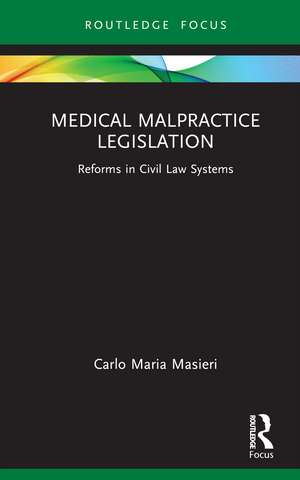Medical Malpractice Legislation: Reforms in Civil Law Systems: Young Feltrinelli Prize in the Moral Sciences
Autor Carlo Maria Masierien Limba Engleză Hardback – 8 mai 2024
In the mid-1970s, a reform movement started in the United States, where there was considerable concern about then ongoing medical malpractice crises. Since the beginning of the current century, France, Germany and Italy have passed statutes that aim to reform medical liability rules. Thus, it is first interesting to assess whether any medical malpractice crises have been identified in these systems and, second, how these have been faced through the passing of new statutes on the continent. Accordingly, the first chapter explores the idea of medical malpractice crisis and its relationship with the insurance market, also considering the reflections of American scholars. It then reconstructs the French, German and Italian legal frameworks, as well as their insurance and litigation contexts, reviewing and commenting on the quantitative evidence that was collected before the reforms. The second chapter briefly summarises the debate on medical malpractice reforms in France, Germany and Italy. It then analyses the statutes that have been passed, distinguishing between reforms that consolidate case law and reforms that introduce innovative solutions, sometimes repealing court-developed doctrines. In particular, the chapter examines in a comparative perspective the diff erent options adopted in these civil law countries with regard to the rules on liability, burden of proof, statute of limitations and damages. Moreover, the chapter examines the reforms of insurance, procedural and evidence law, to the extent they affect medical malpractice cases. The third chapter reviews and analyses the current available data related to medical malpractice litigation and insurance after the reforms adopted in France, Germany and Italy, in order to find out evidence of their effectiveness and efficiency. It also highlights some aspects of medical malpractice law that still belong to the domain of the judiciary. It finally points out which problems may be addressed by the legislatures and what further data should be collected in the future.
This work may interest legal scholars, healthcare providers, insurers and policymakers.
Preț: 382.96 lei
Preț vechi: 416.26 lei
-8% Nou
Puncte Express: 574
Preț estimativ în valută:
73.29€ • 79.58$ • 61.56£
73.29€ • 79.58$ • 61.56£
Carte disponibilă
Livrare economică 02-16 aprilie
Livrare express 18-22 martie pentru 28.61 lei
Preluare comenzi: 021 569.72.76
Specificații
ISBN-13: 9781032576282
ISBN-10: 1032576286
Pagini: 124
Dimensiuni: 138 x 216 x 14 mm
Greutate: 0.39 kg
Ediția:1
Editura: Taylor & Francis
Colecția Routledge
Seria Young Feltrinelli Prize in the Moral Sciences
Locul publicării:Oxford, United Kingdom
ISBN-10: 1032576286
Pagini: 124
Dimensiuni: 138 x 216 x 14 mm
Greutate: 0.39 kg
Ediția:1
Editura: Taylor & Francis
Colecția Routledge
Seria Young Feltrinelli Prize in the Moral Sciences
Locul publicării:Oxford, United Kingdom
Public țintă
PostgraduateCuprins
Introduction
1. Medical Malpractice Before Reforms: Was There Any Crisis?
2. The Age of Medical Malpractice Statutes: What Has Been Targeted?
3. The Aftermath of Reforms: What Has Changed?
Conclusion
1. Medical Malpractice Before Reforms: Was There Any Crisis?
2. The Age of Medical Malpractice Statutes: What Has Been Targeted?
3. The Aftermath of Reforms: What Has Changed?
Conclusion
Notă biografică
Carlo Maria Masieri is Research Fellow in Comparative Private Law at Università degli Studi di Milano, Italy. He was a visiting student researcher at the University of California, Berkeley in 2015, a visiting Ph.D. student at Ruprecht-Karls-Universität Heidelberg in 2016, and a visiting researcher at Cornell University in 2019. Carlo earned the Italian Scholarly Certification for Teaching as an Associate Professor of Private Law in 2019, and of Comparative Private Law in 2020. He authored several scientific publications on tort law, environmental law, climate change law, contracts and privacy.
Descriere
This book aims to analyse the legal tools that the legislatures of France, Germany and Italy adopted in order to regulate medical malpractice. This work may interest legal scholars, healthcare providers, insurers and policymakers.








